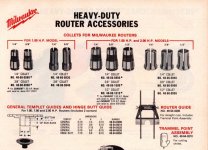Thanks for all the replies!
There are Famag bits from Germany, which may be the better quality than CMT, but appear quite expensive and require delivery from Germany. Still, good to know these options. It would be great if you, Jeff, get in on this size. It appears to be a significant gap in the market.
Arden are also known for being a decent Chinese producer. Their low price may bias some to think that they are less than they are ... but I suspect that they probably manufacture a lot of the bits sold by by others.
I do think that it is interesting that router users have not "discovered" 8mm bits to replace 1/4". At least, no one seems to be mentioning this, although several here have discovered their advantage. I have a large Elu 177e, which is a 1/2" machine. That is great for heavier stock removal. I also have a smaller Elu MOF97e, which has been used to date with 1/4" bits (it cannot use 1/2" bits). Now I want to use it with 8mm bits, and this could open up a new world, where the smaller, lighter router (it really is a beaut, although 20 years old) may be capable of most of which I previously used the 1/2" machine for. For much of the work we do outside a router table, do we need more than what the 8mm bit can offer?
Regards from Perth
Derek

